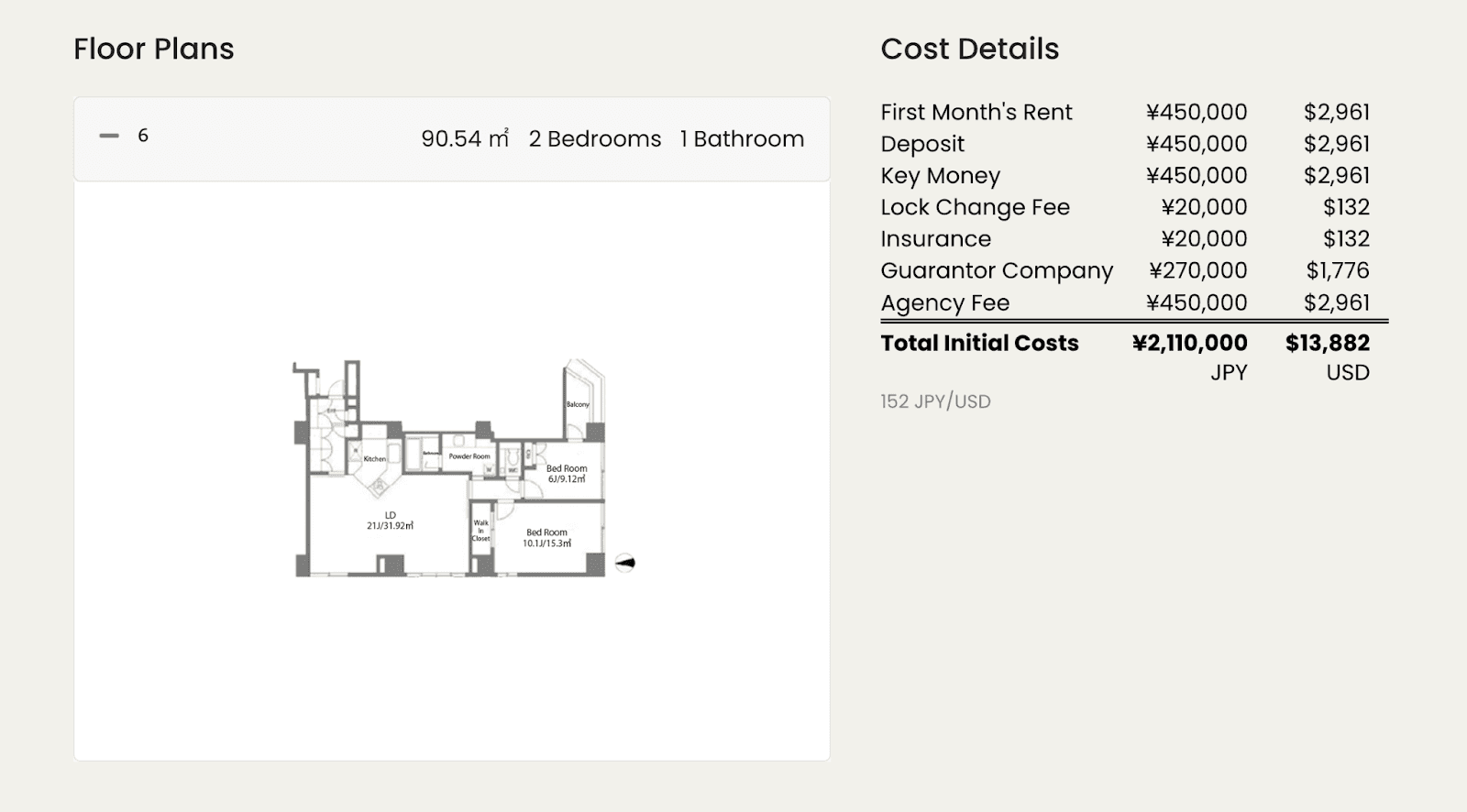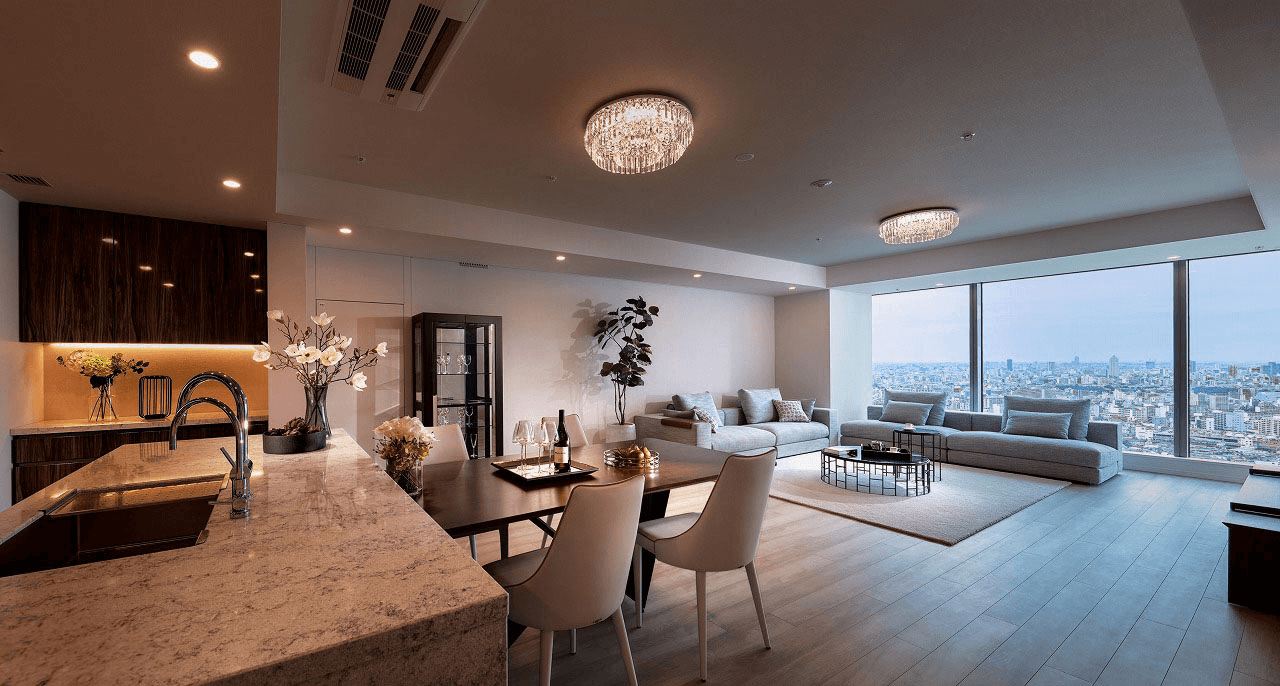Cost to Rent an Apartment in Tokyo
2024/11/16
by
Blackship Realty
Renting an apartment in Tokyo can feel overwhelming, especially with the unique and often hefty upfront costs involved. But with some planning, you'll know exactly what to expect.
In this comprehensive guide, we'll equip you with the essential knowledge to properly budget for your apartment in Tokyo, ensuring that you can make informed decisions and avoid unexpected financial hurdles.
Apartment Layouts and Monthly Rent
When browsing rental listings in Tokyo, you'll encounter a variety of apartment layouts denoted by a combination of numbers and letters. Understanding these designations is crucial to aligning your needs and budget:
1R: Single-room (studio) apartment
1K: One-room apartment with a separate kitchen
1LDK: One-bedroom apartment with a living, dining, and kitchen area
2LDK: Two-bedroom apartment with a living, dining, and kitchen area
On average, the monthly rent for these apartment types in Tokyo can range as follows:
1R: ¥71,583 ($652 USD)
1K: ¥81,217 ($739 USD)
1LDK: ¥120,974 ($1,101 USD)
2LDK: ¥181,996 ($1,657 USD)
Remember, these figures serve as general guidelines, and actual prices can vary significantly based on factors such as location, amenities, and the property's age.
Initial Costs to Rent an Apartment in Tokyo
Renting in Tokyo comes with a significant upfront investment, often requiring three to seven times the stated monthly rent to be readily available.
This substantial sum may come as a surprise to those unfamiliar with the local rental process, but understanding these initial outlays is crucial to a successful apartment hunt.
Security Deposit (Shiki-kin): Typically equivalent to one month's rent, serves as a safeguard for the landlord, covering any necessary repairs or damages upon your departure.
Advance Rent (Mae-Yachin): Necessitates the prepayment of one or two months' rent, depending on your move-in date.
Key Money (Reikin): A non-refundable payment, often equal to one or two months' rent – is traditionally made to the landlord as a gesture of gratitude for accepting your application. While this custom is slowly fading, it remains a common practice in certain areas.
Guarantor Company Fee (Hoshōgaisha Hiyō): For renters who lack a reliable Japanese guarantor, this fee is handled by guarantor companies to reassure landlords of timely rent payments. Typically, it costs around half a month’s rent initially, followed by an annual fee of about ¥10,000.
Rental Agency Commission (Chūkaitesūryō): Equivalent to one month's rent plus tax and is paid to the rental agency that facilitates your apartment search and secures the property on your behalf.

Additional Expenses When Renting an Apartment in Tokyo
While the upfront costs may seem daunting, there are also several hidden expenses to consider when renting in Tokyo.
Furnishings: Many apartments are unfurnished, meaning you’ll need to supply essential appliances like a washing machine, dryer, and refrigerator, which can be a substantial investment.
Maintenance Fee (Kanri-hi): A recurring charge paid to the building management company for the upkeep of common areas and amenities. Confirm whether this fee is included in the advertised rent.
Lease Renewal Fee: When your two-year rental contract approaches its end, you may be required to pay approximately one month’s rent to renew.
Lock-Exchange Fee: This one-time fee, typically around ¥20,000, covers the cost of changing the locks upon move-in for added security.
Fire Insurance: Renters are generally required to obtain fire insurance, costing around ¥20,000 for a two-year policy.
Factors Influencing Rental Costs
Types of Housing
In Japan, there is a differentiation between what is known as mansion and apāto. Mansion refers to a type of condominium constructed from reinforced concrete, typically signifying a mid- to high-end residential building with advanced infrastructure and security features. These buildings offer better insulation, soundproofing, and security, making them more expensive and preferred for modern, secure living.
Apāto (apartments), on the other hand, are usually smaller, built from wood, and often lack the same advanced features as mansions. They are more affordable, making them a popular choice for students, young professionals, and families.
Share houses offer private or shared rooms with communal spaces. Popular for affordability and flexibility, they foster a sense of community. Rent ranges from ¥45,000-¥60,000 in central Tokyo, or ¥30,000-¥45,000 in other wards. A security deposit of around ¥20,000 is typically required.
Also called gaijin houses, guest houses affordable options cater to short-term tenants, often foreigners. Rent is usually ¥40,000-¥100,000 for a shared room, with private rooms at around ¥100,000. They offer flexible contracts and no upfront fees.

Age of the Property
Newer, modern buildings usually command higher rents due to updated facilities and designs, while older properties, if well-maintained, provide more budget-friendly choices.
Location
Proximity to the city center and major transportation hubs is the most important factor. Properties in central wards tend to have higher rents, whereas those in outer wards of Tokyo or neighboring prefectures like Kanagawa, Chiba, and Saitama are more affordable, albeit with potentially longer commutes.
Conclusion
Renting an apartment in Tokyo can be a complex process, but with the right preparation and understanding of the upfront investments, hidden costs, and factors influencing rental prices, you can find the perfect home that fits your needs and budget.
By considering all these elements, you'll be well-equipped to navigate Tokyo rentals and make an informed decision that aligns with your lifestyle and financial constraints.